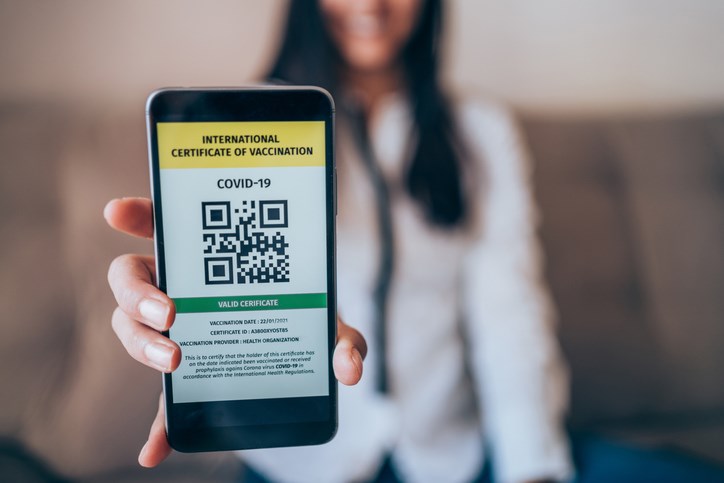Earlier this month, the Winnipeg Blue Bombers of the Canadian Football League (CFL) played in front of almost 30,000 fans at IG Field. The game was the first major test of the way in which “vaccine passports” can be used to allow Canadians to gain access to specific events during the COVID-19 pandemic.
Spectators were only allowed inside the home stadium of the Blue Bombers if they presented their provincial Immunization Card and a matching photo identification. They also had to wear a mask in all indoor common areas. In order to further reduce the possibility of contact, only mobile tickets were allowed and all transactions at the concession stands were processed through credit, debit and digital payments.
The return of sporting events to British Columbia was slightly different. BC Place was not allowed to have full capacity for the first home games of the CFL’s BC Lions and the Vancouver Whitecaps of Major League Soccer (MLS). The venue recommended mask-wearing and also instituted “cashless” concession stands, but proof of vaccination was not required for attendees.
When Research Co. and Glacier Media asked British Columbians about their , we found the majority of respondents agreed with the concept for different forms of human interaction. Five months later, the public’s perceptions have not budged, and support has actually risen in some cases.
Practically two thirds of British Columbians (67%, up five points) support the use of “vaccine passports” in order to go to live sporting events as spectators. The numbers are remarkably similar for attendance to live concerts (66%, up four points), something that unfortunately will not be tested in the long-awaited Rolling Stones concert in Vancouver that was summarily cancelled a few weeks ago.
British Columbians also remain supportive of “vaccine passports” to be able to visit a gym or fitness facility (63%, up one point). This month, we see a higher level of support to rely on a system that ensures only fully immunized British Columbians can go to the theatre or cinema (62%, up six points) and also to work at an office (63%, up five points). There are huge implications on these last two interactions, as we await the release of motion pictures that will desperately seek paying customers at the multiplex and with many adult residents of the province pondering just how many days they will be able to work from home.
There is little movement on requiring a “vaccine passport” to travel within the province (61%, up one point), but the proportion of residents who endorse the concept for a trip to other provinces jumped from 64% in March to 69% this month. Once again, the most supported idea is to use the “vaccine passport” for international travel (77%, up four points).
The fact that British Columbia has not moved quickly on “vaccine passports” may be playing a role in our willingness to return to life as it was before COVID-19. Right now, a majority of the province’s residents say they are willing to enjoy a meal at a restaurant outdoors (70%) or indoors (56%), as well as to visit a barbershop or salon (54%) or a library (53%). These four activities may allow for enough physical distancing and some reassurance if a person chooses to wear a mask.
Other activities are clearly less attractive right now, with just over a third of British Columbians saying they would have no qualms about riding on the bus (37%), riding on SkyTrain (also 37%), or visiting a Community Centre (34%). Even fewer feel ready to visit a gym or fitness facility (28%), attend a concert or dance at a music venue (23%) or go to a live sporting event as a spectator (20%).
This last statistic brings us back to the example set by Winnipeg. Manitoba’s provincial government was the first one to actually implement a “vaccine passport” in early June and spent weeks preparing the population for the moment when immunization would be required for specific activities. If British Columbia had jumped early on the idea of an immunization card, instead of making an initial announcement in late August, perhaps we would see more than one in five residents saying they are ready to go to a game.
Manitoba’s management of the “vaccine passport” concept and roll-out during an event attended by tens of thousands of fans provides a stark contrast to the dreadful experience of Londoners during the European soccer championships, where the final match led to more than 5,000 likely COVID-19 infections. British Columbia did not react with the same speed as Manitoba, leading to a venue that has been partially open.
If the average CFL fan in Winnipeg had found the “vaccine passport” intrusive and excessive, the stadium would not have been filled at near capacity. We have known for months that British Columbians welcome this concept. There is something to be learned from the success of jurisdictions that chose to pay attention to the wishes of the willingly vaccinated, and not to the musings of those who wander the dark corners of the web trying, and failing, to accurately type the word “fascist” into emails and social media messages.
Results are based on an online survey conducted from August 19 to August 21, 2021, among 800 adults in British Columbia. The data has been statistically weighted according to Canadian census figures for age, gender and region in British Columbia. The margin of error—which measures sample variability—is +/- 3.5 percentage points, 19 times out of 20.




